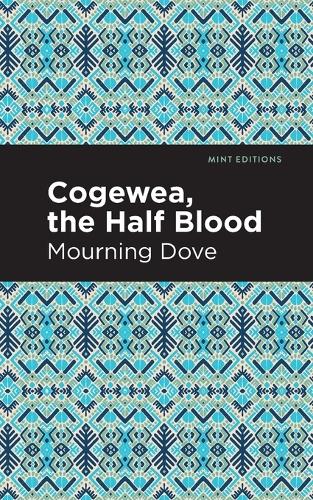
Cogewea, the Half Blood: A Depiction of the Great Montana Cattle Range
(Paperback)
Available Formats
Publishing Details
Cogewea, the Half Blood: A Depiction of the Great Montana Cattle Range
By (Author) Mourning Dove
Contributions by Mint Editions
Mint Editions
Mint Editions
15th January 2025
United States
Classifications
General
Fiction
Romance: western, rural or outback
Physical Properties
Paperback
278
Width 127mm, Height 203mm
Description
The last rays of the day-God, glinting through the tangled vines screening the great porch of the homestead of the Horseshoe Brand Ranch, fell upon a face of rare type. The features were rather prominent and well defined. The rich olive complexion, the grave, pensive countenance, proclaimed a proud descent from the only true Americanthe Indian. Of mixed blood, was Cogewea; a "breed"!the socially ostracized of two races. Her eyes of the deepest jet, sparkled, when under excitement, like the ruby's fire. Hair of the same hue was as lustrous as the raven's wing, falling when loose, in great billowy folds, enveloping her entire form. Her voice was low and musical, with a laugh to madden the gods.
The young half-blooded maiden Cogewea McDonnald is caught between two worlds. Embracing the proud heritage of her Okanagan mother yet enjoying the privileges of her European father, she struggles with an unwinnable dichotomy, with which she may never make peace. Excluding this internal feud, however, the life that she lives is carefree.
Well-loved and well-educated, Cogewea is a welcomed figure on her brother-in-laws ranch and the apple of James LaGrindes eye. A half-blood himself, the ranch foreman dotes on the young beauty and believes that in time, shell return his affectionsthat is until the arrival of Alfred Densmore. When the new European rancher sets his sights on Cogewea, a battle for her loveand presumed earthly richescommences, once again setting the young girl up on conflicting ends of her cultural lines.
Cogewea the Half Blood (1927) is Mourning Doves first and only novel that mixes Native American folklore and history into the Western and romance genres; serving not only as one of the earliest novels by a Native American to feature a female protagonist, but also as one of the first examples of Native American literary criticism.
Author Bio
Christine Quintasket (Hum-ishu-ma), better known by her pen name, Mourning Dove (1884 - 1936) was a Native American author. Born in a canoe on the Kootenai River, Quintasket was the daughter of a Sinixt Chief and a mixed-raced Okanagan. Quintasket would learn the art of storytelling from her maternal grandmother and be inspired to become a writer due to her education at the Sacred Heart School of Goodwin Mission. Forced to give up her language and being exposed to derogatory representations of Indigenous people in books, Quintasket desired to combat racist stereotypes through the written word. Like Sophia Alice Callahan's Wynema: A Child of the Forest, Quintasket's 1927 novel Cogewea the Half Bood was one of the earliest novels written by a Native American women and published in the United States as well as one of the earliest novels by a Native American author to feature a female protagonist. Six years after this, she would go on to publish Coyote Stories which collects over two dozen legends that she heard from her grandmother and tribal elders. Quintasket would marry twice before her death in 1936 and remains an important figure in Native American literary history.
